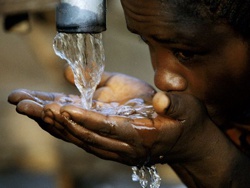A national workshop on dissemination and appropriation of the Economic Community of West African States (ECOWAS) guidelines for the development of water infrastructure opened in Accra on Monday.
The two-day workshop being organised under the auspices of the Ministry of Water Resources Works and Housing, in collaboration with Water Resources Coordination Centre (CCRE) of ECOWAS and the International Union for Conservation of Nature (IUCN) of Burkina Faso aimed at contributing to the promotion of the best practices at national and cross-border levels in the construction and management of large dams.
Addressing participants at the opening, Mr Ben Yaw Ampomah, Executive Secretary, Water Resources Commission said many water infrastructure generate multiple and varied negative impacts with far reaching consequences from the source.
He said in order to minimise these negative impacts, owners of dams and stakeholders as a whole need to take into account the best management practices of water infrastructure.
“To this end, EOCWAS through its CCRE, launched in late 2008, a regional consultative forum on large water infrastructure projects in West Africa to help develop large water infrastructure in West African States,” Mr Ampomah said.
He noted that the process of the dialogue on large dams was proposed for larger river basins in the West African Sub-region, with the view to maintain the principle of the dialogue at the regional level.
“And this workshop will help develop a strategy to integrate the guidelines and ECOWAS directive into national regulations, policies and practices targeting the development of water infrastructure at the national scale and cross border level,” he said.
Mr Ampomah indicated that guiding against all hazards to acceptable standards in terms of developing and construction of dams is a major expected outcome of the workshop.
He therefore called on all adopt the guidelines that would complement and guard against potential dam breakages.
Dr Kwaku Agyeman Mensah, Minister of Water Resources, Work and Housing, in a speech read on his behalf observed that dams are the basic infrastructure of support to the economic and development of the country.
He however cautioned that if not properly managed, it becomes a source of misfortune to the country with its effect being colossal.
Dr Agyemen Mensah therefore lauded CCRE and IUCN for their collaborative works with the ministry in informing stakeholders at the community, regional and national levels on dams and the relevance of the results to Ghana.
He therefore advised dam owners to take adequate measures before constructing a dam and noted government’s commitment towards ensuring the effective use of dams as they serve many purposes to the country.
Professor Aboubacar Awaiss, Regional Coordinator, Water and Wetlands Programme, ICUN, said the organisation is working with a panel of experts to combine information that would be used a s a baseline information towards the guidelines for the country’s progress.
He said the workshop is timely because ICUN is working closely with the Volta Basin Authority (VBA) in the decision making process for the construction of water infrastructure.
Mr Mohamane Dedeou Toure, ECOWAS CCRE, Representative, said the guidelines would be good for the promotion of socio-economic development of Ghana especially when a number of countries share water bodies with the country.
He said the principles would help extensively in the management of water bodies with the involvement of all people.
“It is expected of all countries to own these guidelines, and we are going to back it with the legal aspects,” Mr Toure said.
Dr Charles Binney, Acting Executive Director, VBA, called for active involvement of stakeholders for a sustainable goals to be met as the approach is going to help the country socially and economically.
The workshop brought together 30 stakeholders whose work is affected one way or the other, by projects of dams and their related facilities.
Regional News of Wednesday, 30 September 2015
Source: GNA
Workshop on guidelines for the development of water opens
 File photo
File photo












